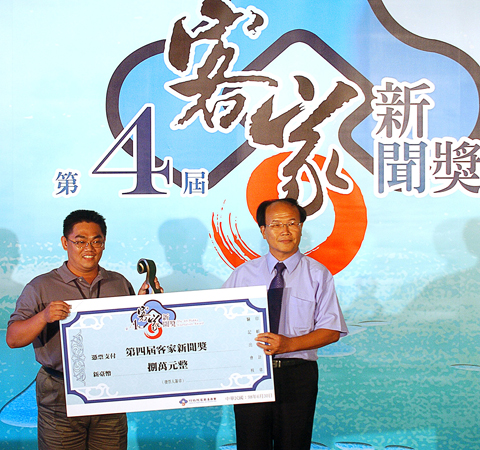A Hakka Journalism Award recipient yesterday accused the Council for Hakka Affairs (CHA) of restricting his freedom of speech after it refused to show a recorded message about his nomination at the award ceremony.
Yeh Jih-chia (葉日嘉), a freelancer, received this year’s Hakka Journalism Award for his report on the Miaoli County Government’s demolition of historic kilns in Houlong Township (後龍), which was published in Hakka Magazine earlier this year.
The three kilns, torn down in January to make way for a development project, were the last kilns built during the Japanese colonial period to manufacture bricks and pottery, when Miaoli was the country’s pottery production center.

PHOTO: WANG MIN-WEI, TAIPEI TIMES
After submitting his work and receiving a nomination for the award, Yeh was asked by the council to introduce his own work and share his thoughts in a video clip.
The council has been showing video recordings by award nominees at its award ceremony since the award was first held three years ago.
As Yeh is also a member of the campaign to save the kilns, in the video clip he held up signs asking Miaoli County Commissioner Liu Cheng-hung (劉政鴻) to apologize and Miaoli International Culture and Tourism Bureau director Lin Chen-feng (林振豐) to step down.
“I sent my video on Tuesday [last week] and received a telephone call from an official asking if I could change the content because they considered it inappropriate,” Yeh said after receiving the award yesterday.
“The official said they were afraid showing the video could create conflict between the council and the Miaoli County Government,” he said.
“I said I wouldn’t change it and it was up to them whether to show it or not,” he said.
Although an independent panel of judges decided to give the award to Yeh, the council decided not to show his video, making Yeh one of only two nominees without a video presentation.
The other, Chung Chao-wen (鍾肇文), passed away before he could make a video.
“I think that the council is too conservative. It’s my right to say what I want to say in my video,” Yeh said. “If there are any consequences, I will take responsibility for what I say.”
The council’s Public Media Center deputy director, Andrew Yu (游進忠), said it was his decision to block Yeh’s video.
“If we showed the video at an award ceremony organized by the council, it would be like a government organization attacking the head of another government organization — that’s something we simply cannot do, otherwise we would upset people,” Yu said. “There’s no freedom of speech at a government agency.”
Minister of the Council for Hakka Affairs Huang Yu-chen (黃玉振), who said he was unaware of the decision until told by reporters, supported Yu’s decision.
Chiang Min-hsiu (江明修), dean of National Central University’s College of Hakka Studies and head of the panel of judges for the award, however, disagreed.
“Whatever Yeh has to say represents only himself, not any other organization, and should be respected,” Chiang said. “Especially because what he feels about the entire issue was what motivated him to write the story that won the award.”
“I think the council overreacted,” he said.

Chinese Nationalist Party (KMT) Chairman Eric Chu (朱立倫), spokeswoman Yang Chih-yu (楊智伃) and Legislator Hsieh Lung-chieh (謝龍介) would be summoned by police for questioning for leading an illegal assembly on Thursday evening last week, Minister of the Interior Liu Shyh-fang (劉世芳) said today. The three KMT officials led an assembly outside the Taipei City Prosecutors’ Office, a restricted area where public assembly is not allowed, protesting the questioning of several KMT staff and searches of KMT headquarters and offices in a recall petition forgery case. Chu, Yang and Hsieh are all suspected of contravening the Assembly and Parade Act (集會遊行法) by holding

PRAISE: Japanese visitor Takashi Kubota said the Taiwanese temple architecture images showcased in the AI Art Gallery were the most impressive displays he saw Taiwan does not have an official pavilion at the World Expo in Osaka, Japan, because of its diplomatic predicament, but the government-backed Tech World pavilion is drawing interest with its unique recreations of works by Taiwanese artists. The pavilion features an artificial intelligence (AI)-based art gallery showcasing works of famous Taiwanese artists from the Japanese colonial period using innovative technologies. Among its main simulated displays are Eastern gouache paintings by Chen Chin (陳進), Lin Yu-shan (林玉山) and Kuo Hsueh-hu (郭雪湖), who were the three young Taiwanese painters selected for the East Asian Painting exhibition in 1927. Gouache is a water-based

Taiwan would welcome the return of Honduras as a diplomatic ally if its next president decides to make such a move, Minister of Foreign Affairs Lin Chia-lung (林佳龍) said yesterday. “Of course, we would welcome Honduras if they want to restore diplomatic ties with Taiwan after their elections,” Lin said at a meeting of the legislature’s Foreign Affairs and National Defense Committee, when asked to comment on statements made by two of the three Honduran presidential candidates during the presidential campaign in the Central American country. Taiwan is paying close attention to the region as a whole in the wake of a

OFF-TARGET: More than 30,000 participants were expected to take part in the Games next month, but only 6,550 foreign and 19,400 Taiwanese athletes have registered Taipei city councilors yesterday blasted the organizers of next month’s World Masters Games over sudden timetable and venue changes, which they said have caused thousands of participants to back out of the international sporting event, among other organizational issues. They also cited visa delays and political interference by China as reasons many foreign athletes are requesting refunds for the event, to be held from May 17 to 30. Jointly organized by the Taipei and New Taipei City governments, the games have been rocked by numerous controversies since preparations began in 2020. Taipei City Councilor Lin Yen-feng (林延鳳) said yesterday that new measures by